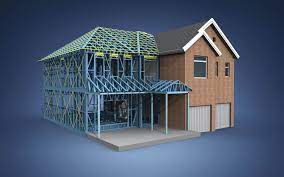Shaping the Future of Urban Living With Innovations Architectural Drawing Services
In an era marked by rapid urbanization and technological advancement, architectural drawing services have emerged as a critical force in shaping our cities and built environments. This article explores the evolving landscape of architectural drawing services, focusing on three key innovations that are revolutionizing the way we conceptualise, plan, and construct structures.
Sustainable Design: Pioneering a
Greener Future
In response to the escalating
global climate crisis, sustainable design has taken centre stage in
architectural practices. Architects now employ cutting-edge technologies and
eco-friendly materials to create structures that minimize environmental impact.
Concepts like passive design, green roofs, and renewable energy integration are
becoming commonplace, reflecting a collective commitment to a more sustainable,
ecologically balanced future.
Moreover, architects are
increasingly incorporating principles of circular economy into their projects.
This involves designing with the end of a building's life cycle in mind, aiming
to repurpose and recycle materials rather than sending them to landfills. By
embracing sustainability as a core tenet,
architectural
drawing services are not only reducing the carbon footprint of their
projects but also setting new standards for responsible urban development.
Digital Twins and Virtual
Reality: Redefining Design Visualization:
The integration of digital twins
and virtual reality (VR) technologies represents a seismic shift in the way
architects conceptualize and present their designs. A digital twin is a
comprehensive, virtual replica of a physical building or environment, allowing
architects to simulate real-world scenarios and test various design iterations.
This enables a deeper understanding of how a structure will function and
interact with its surroundings.
VR, on the other hand, provides
an immersive experience for clients and stakeholders to navigate through a
virtual representation of a building before it's even constructed. This
transformative technology not only enhances client engagement but also
facilitates more informed decision-making during the design phase. It allows
for adjustments and refinements in real-time, resulting in more precise and
client-centric design solutions.
Adaptive Reuse and Urban
Regeneration: Breathing New Life into Old Spaces:
Architectural
drawing services are
increasingly turning towards adaptive reuse as a means to address urban sprawl
and preserve cultural heritage. This approach involves repurposing existing
structures for new functions, breathing new life into old and underutilised
spaces. By doing so, architects are not only conserving valuable resources but
also contributing to the revitalization of urban neighborhoods.
Historic buildings, factories,
and warehouses are being transformed into vibrant mixed-use spaces, blending
the old with the new in a seamless fusion of architectural styles. This trend
not only preserves the character of cities but also fosters a sense of
continuity between the past and present. It serves as a testament to the
adaptability and creativity of architectural drawing services in reimagining
urban landscapes.
Conclusion
Architectural drawing services
have entered an era of unprecedented innovation and transformation. The
integration of sustainable design principles, digital twins, and adaptive reuse
strategies are reshaping the way we approach urban development. As architects
continue to push boundaries and explore new frontiers, we can expect our cities
to evolve into more sustainable, efficient, and culturally rich environments.
Through these innovations, architectural drawing services are not only building
structures but also crafting a legacy of responsible, forward-thinking urban
living.



Comments
Post a Comment